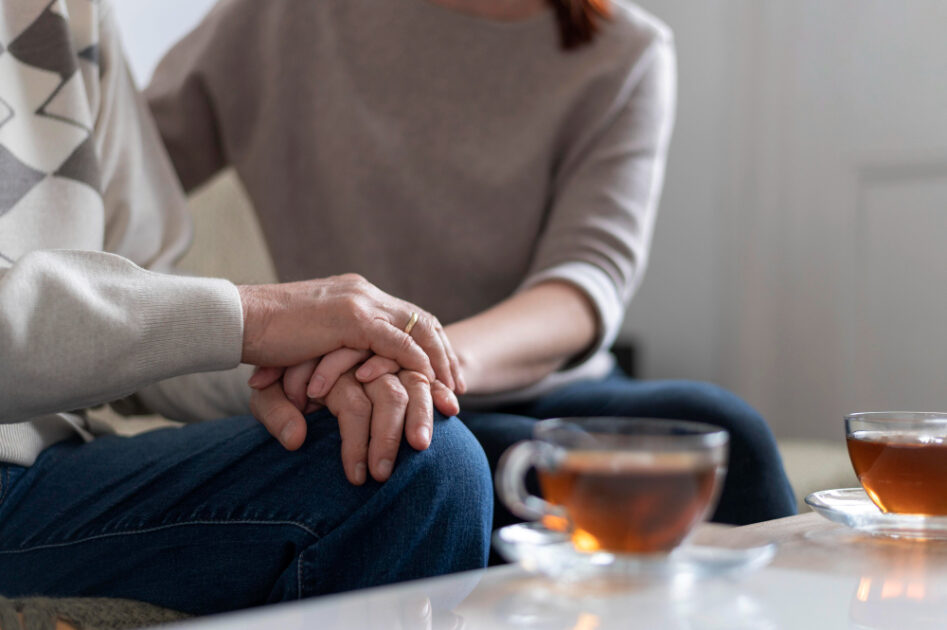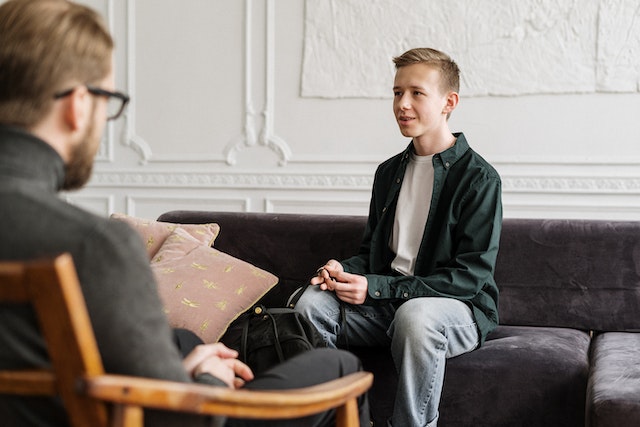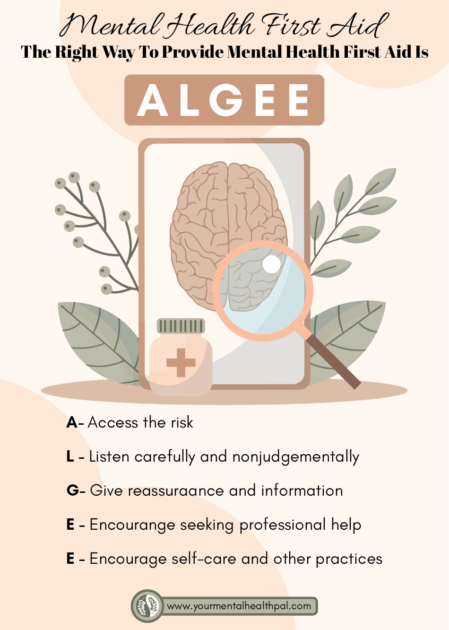Most business organizations now teach their employees first aid techniques. That way, the majority at the fundamental level know the ABC (airway, breathing, and cardio) of first aid assistance.
But what if the person requiring help is not hurt physically?
Did you know that 25% of the world’s population develops a mental health issue at least once in their life? Mental health illnesses constitute a large chunk of the overall health problems worldwide. The World Health Organization says that 350 million people, or a staggering 4% of the world’s population, have depression. Major Depression is believed to be the second leading cause of disability. It is estimated that 1 in 6 people have faced some mental health issue or the other in the past week.
So the chances are high that you may encounter a person feeling similarly at some point. It’s hard to know what to do precisely in these situations. We constantly worry if we are saying or doing the right things. Nobody ever taught us these things while growing up, which makes it even more difficult.
This is exactly where Mental Health First Aid acquires importance.
Knowing the basics of Mental Health First Aid means recognizing the signs and symptoms of various mental health issues and addictions. That makes you capable of helping people find the much-needed help and support they need.
What is Mental Health First Aid?
Let’s take it from the very basics.

What is First Aid?
First Aid aims at providing initial support and help until professional help is received.
Now apply the same logic to mental health. Mental Health First aiders provide support and assistance for mental health problems until professional help is received or needed.
We all have heard of Cardio-Pulmonary Resuscitation. Right? It is short of CPR. Yes, the same technique you associate with 90s Hollywood cinema. Just as CPR assists with heart attacks, Mental Health First Aid helps assist someone suffering from mental health or substance-abuse-related problems.
The various Mental Health First Aid courses available online teach you about mental health conditions’ risk factors and warning signs.
They teach you several strategies to help someone in crisis and non-crisis situations. And the key to mental health treatment is early diagnosis and timely treatment.
Mental Health First Aid Certification
Mental Health First Aid (MFHA) International is a non-profit organization that provides mental health first aid certification. It creates, delivers, and evaluates associated evaluation programs to allow more people to become capable of providing mental health assistance.
Are you wondering what exactly is taught in these programs?
Any Mental Health First Aid program has five basic components:
1. Risk Assessment

Risk assessment forms a crucial part of providing mental health aid. While helping a person with mental health problems, the aiders should be able to identify signs of:
- Self-harm,
- Suicidal tendencies, or
- Other harm.
You should always seek emergency help if a person’s life is in danger.
2. Ability to Listen

Hearing and listening are two very different words. Hearing is defined as the ‘process of sensing sound.’ You hear a variety of different sounds in the day. However, you don’t necessarily interpret their meaning.
On the other hand, listening is the ‘ability to pay attention to a sound.’ To listen is to rationalize. It is the process of interpreting what the person is trying to say. Mental Health First Aid courses teach the art of listening by:
- Verbal skills
- Non-verbal skills like- Eye contact, Body Posture, etc.
3. Providing Reassurance and Information

Many people don’t realize that mental illnesses are actual health problems. If proper care and treatment are provided, a person will be able to get better.
That is why MFHA teaches you to be reassuring during the conversations. If the person is anxious, maintain your calm. Approach the conversation with kindness and respect.
Throughout the MFHA training program, people learn about various channels of help. This is to help them redirect people who are suffering toward these channels.
4. Encourage Professional Help

Different types of professionals and professional help are available for people in need. A Mental Health First Aider should always encourage people to seek proper help.
Types of professionals:
- Doctors
- Social workers and counselors
- Certified peer specialists
Types of professional help:
- Psychotherapy
- Medications
- Other professional help
5. Encourage Self-Care and other practices

People need to realize the importance of their contribution to healing. MFHA teaches the aiders to help people learn the same. It aims to spread mental wellness through:
- Exercise
- Mediation
- Self-help books
- Meeting and engaging with people
How to Give Mental Health First Aid?
You can apply Mental Health First Aid skills anywhere, anytime. This whole idea is built on similar terms as first aid. You are not expected to solve the problem but provide adequate help and relief until professional help is available.
Let’s understand this situation.
If someone is depressed, you are not taught to provide them with medications or therapy. Instead, as an aider, you will know how to manage this situation and get proper help for the person.
The CPR alternative for Mental Health is ALGEE:
A- Access the risk
L- Listen carefully and nonjudgmentally
G- Give reassurance and information
E- Encourage seeking professional help
E- Encourage self-care and other practices

Even if you know these practices in theory, they are hard to use. That is why you should join an MFHA course right away to get yourself started.
It does not just help the people around you but also provides you with a sense of satisfaction yourself. This gives you the confidence to say and do the right things in times of crisis. It will help you realize that it doesn’t take too much to make an actual difference.
Role and Importance of Mental Health First Aid
Over 2 million people have been trained to become Mental Health First Aiders in the US. This number might sound huge, but it only means 1% of the total population. There are very few people who know how to respond when it comes to mental health.
There is tangible evidence that mental health awareness has created a positive impact. MFHA makes a wider impact on mental health and well-being. It helps create an environment of support and empathy.
If you think no one in your life has ever had a mental health issue, chances are you have not read the situation properly. Mental Health First Aid courses will help you apply the knowledge to the people you love and yourself.
Ensuring that proper care is available for those in need is our responsibility. Becoming an aider teaches you to be the one to begin conversations. It doesn’t really help you catch a lie or get someone to talk against their will. However, it does teach you what to look for.
You could save someone’s life by asking the right questions and knowing where to get help.
That’s quite a reason to join a course right away, isn’t it?
Conclusion
Everyone you meet is dealing with something or the other. They are in a spectrum of needing self-help. More often than not, you are flustered when you don’t know how to help someone, but you really want to. You wish you could just understand and change things for them. Both these feelings are normal. However, just wishing won’t get the job done. MFHA programs help you understand how to help.
Stephanie Sunderland, a famous mental health trainer, once said in her class that it sounds sappy like the signs you see. But the truth is all anyone of us really want is to be able to breathe, live, and laugh.
That’s exactly all we aspire right? The primary goal of Mental Health First Aid is to allow everyone to have that chance.
Now that you know what Mental Health First Aid is, let’s take you in-depth on the first step. Read to understand how to start a conversation with someone suffering from mental illnesses.
Mental health awareness needs to take center stage. To learn more, subscribe to Your Mental Health Pal.


A very well researched blog. Loved reading your blogs. Keep doing it.
indeed a good article. very well explained.
Very well written 👍
Beneficial blog👍Waiting for more😊